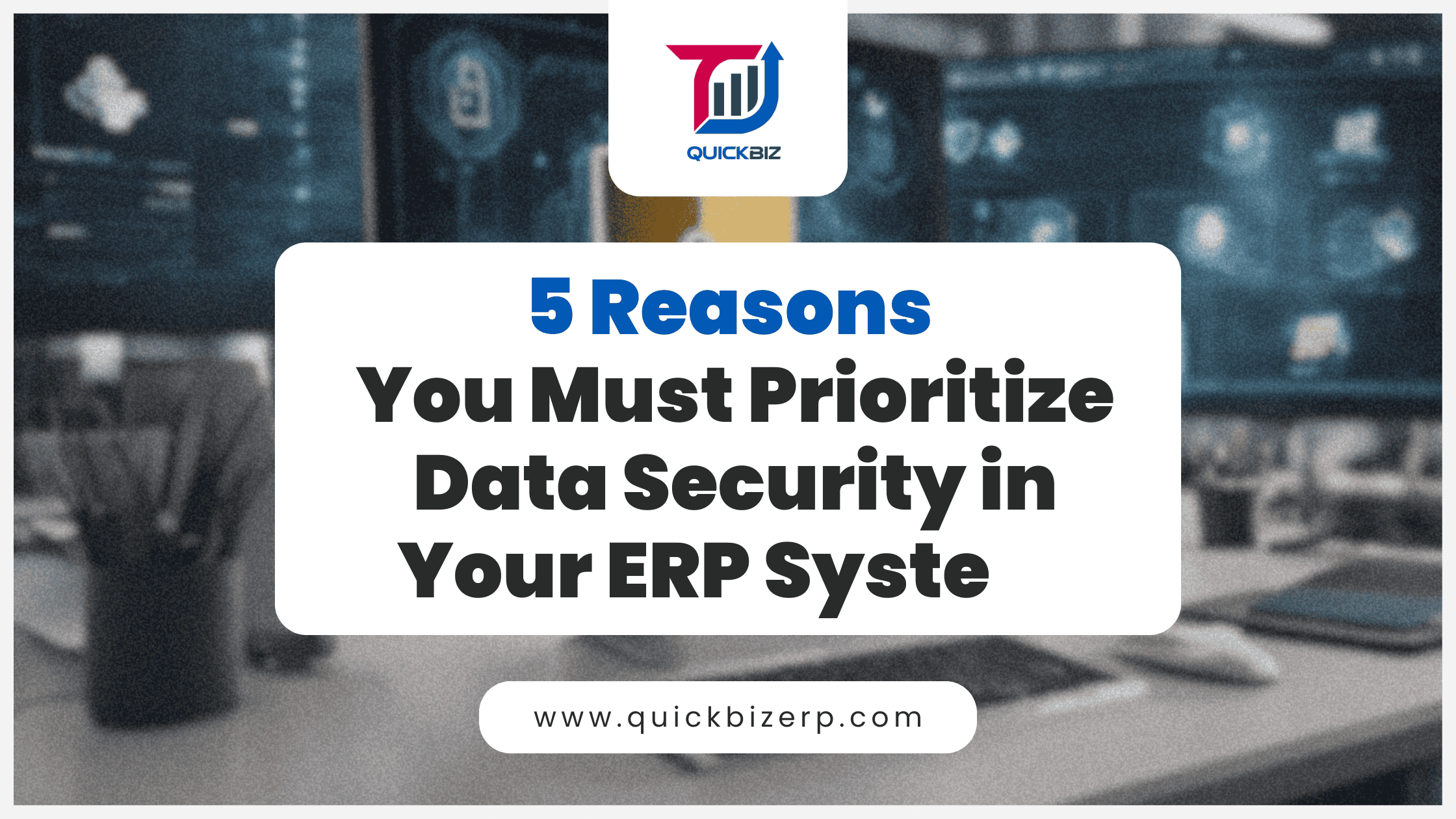5 Reasons You Must Prioritize Data Security in Your ERP System

Introduction
In today’s digital landscape, data security is no longer just a technical concern—it’s a business imperative. As companies increasingly rely on Enterprise Resource Planning (ERP) systems to manage operations, financials, and customer data, protecting sensitive information is more critical than ever.
However, ERP systems are prime targets for cyberattacks. A single security breach can lead to data theft, financial losses, and reputational damage. Without robust security measures, businesses risk exposing confidential information to unauthorized users, malware, and hacking attempts.
To mitigate these risks, modern ERP solutions incorporate advanced security features such as encryption, role-based access control (RBAC), and automated backups. In this article, we’ll explore five key reasons why prioritizing data security in your ERP system is essential for business success.
1. Protection Against Cyber Threats
Cybercriminals are constantly evolving their attack strategies, making ERP systems vulnerable to threats such as ransomware, phishing, and insider attacks. According to recent reports, 43% of cyberattacks target small and medium-sized businesses, many of which rely on ERP platforms to streamline operations.
To combat these risks, ERP providers implement:
- Firewalls and Intrusion Detection Systems (IDS): Monitor and block unauthorized access.
- Multi-Factor Authentication (MFA): Requires multiple credentials before granting system access.
- End-to-End Encryption: Ensures that data remains protected even if intercepted.
2. Compliance with Data Protection Regulations
With strict data privacy laws like GDPR (General Data Protection Regulation) and HIPAA (Health Insurance Portability and Accountability Act), businesses must ensure that their ERP systems adhere to regulatory compliance standards. Non-compliance can lead to hefty fines, legal repercussions, and reputational damage.
ERP systems support compliance by offering:
- Automated Audit Trails: Track and record all system activities for compliance reporting.
- Access Controls: Restrict user permissions based on job roles.
- Data Anonymization: Protects personal data by masking sensitive information.
3. Secure Access and Authentication
One of the biggest security risks in ERP systems is unauthorized access—whether by employees, external hackers, or compromised user credentials. A data breach caused by weak authentication can expose critical financial, operational, and customer data.
To prevent unauthorized access, modern ERP platforms integrate advanced authentication mechanisms, such as:
- Role-Based Access Control (RBAC): Limits system access based on job responsibilities.
- Single Sign-On (SSO): Enhances user authentication while reducing password fatigue.
- Biometric Authentication: Uses fingerprints, facial recognition, or retina scans for secure login.
4. Data Backup and Disaster Recovery
No business is immune to data loss—whether due to cyberattacks, accidental deletions, or system failures. A robust data backup and disaster recovery plan is crucial to ensure business continuity and minimize downtime.
ERP systems provide:
- Automated Backups: Regularly scheduled data backups to secure locations.
- Cloud-Based Storage: Ensures data accessibility even in the event of a local system failure.
- Disaster Recovery Planning: Rapid data restoration in case of a security breach or system crash.
5. Safeguarding Business Reputation and Trust
A data breach can be catastrophic for a company’s reputation. Customers, partners, and stakeholders expect businesses to keep their data safe. Failing to do so can result in loss of trust, negative publicity, and financial consequences.
ERP systems help safeguard reputation by:
- Providing Real-Time Security Monitoring: Detect and mitigate threats before they escalate.
- Ensuring Compliance with Data Protection Standards: Boosts customer confidence in data security.
- Enhancing Transparency in Data Handling: Builds long-term trust with clients and stakeholders.
Conclusion
In an era where cyber threats are more sophisticated than ever, securing your ERP system should be a top priority. From cyberattack prevention and regulatory compliance to secure authentication, disaster recovery, and reputation management, implementing robust data security measures is essential for long-term business success.
Now is the time to assess your ERP security strategy. Investing in secure ERP solutions ensures business continuity, regulatory compliance, and customer trust—all while safeguarding your most valuable asset: data.

